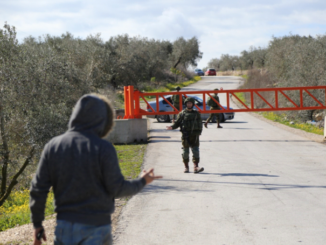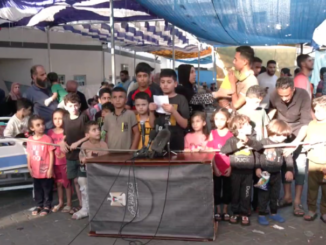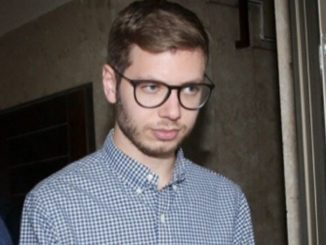
I am currently working in one of the busiest, and most specialized, trauma centers in Johannesburg, South Africa. When coming on for duty over a weekend shift, one can be sure that it will be an exceptionally busy one, with a multitude of patients with gunshot wounds (including to the chest and head). We move quickly to secure the airway, insert intercostal drains for chest wounds and establish intravenous access in our unstable patients.
As I do all of this I know that I have the support of an experienced nursing workforce, equipment, and a controlled working environment to carry out my duties as a doctor. Over the weekend, I was shocked by a video circulating on social media: Muhammad Nayif Yusif al-Hawm, a 14-year-old boy in Gaza, was shot in the chest by an Israeli sniper. I watched anxiously as Gazan medical personnel attempted to do all of the above in a makeshift tent, desperately trying to save his life.
Having been in the same situation but under much better circumstances many times before, I distinctively knew what they felt: the extreme pressure of trying to work quickly to save a life, the angst of seeing the patient deteriorating acutely in front of you, the adrenaline rushing through your veins as your hands move instinctively, the chaos…the excruciating helplessness when the patient passes away. Muhammad passed away.
I couldn’t bring myself to watch the follow-up video as Muhammad’s mother anguished over his lifeless body. Another child, 11-year-old Nasir Azmi Musbah, also passed away after being shot in the head, along with five other Palestinians. They had all been shot with targeted live ammunition by Israeli snipers as they took part in the Great Return March on the borders of Gaza.
Occurring since March 30 of this year, Palestinians have been peacefully protesting every Friday on the Gaza border in their thousands, calling for Palestinian refugees’ right of return to their homes from which they were removed to make way for present-day Israel, and also protesting the strict blockade imposed on the Gaza Strip which makes their lives almost completely unlivable.
Over the last 6 months, 203 Palestinians have been killed in Gaza, including ten, whose bodies are being held by Israeli forces (two of them minors). These include 30 children, one woman, two journalists, three paramedics, and three persons with a disability. Another 10,234 people were injured, including 1,849 children, 424 women, 115 paramedics, and 115 journalists.
The figures poignantly illustrate a point no amount of Israeli propaganda can deny: these protests are peaceful, attended by many women and children and have attracted the everyday Gazan in their quest for justice. Muhammad’s mother would not have allowed her 14-year-old son to attend the protest had she suspected any form of bilateral violent encounter. No mother would send their child into the midst of any dangerous situation.
Amnesty International declared that it had “not documented any instances where protesters posed an imminent threat to the lives of Israeli soldiers and snipers, who have been located behind the fence, protected by military equipment, sand hills, drones, and military vehicles.” Why the use of live ammunition, targeted shooting of minors at their heads and chests with the aim to kill, and indiscriminate, disproportionate murder of Palestinians continues then, is a question the Israeli Defence Force’s morality will find difficult justifying?
Erica Chenoweth and Maria J. Stephan have written an excellent article in which they undertake a systematic study of resistance movements to authoritarian governments in the 20th century, in an attempt to determine which methods are more successful. They examined 323 different movements from 1900 to 2006, involving both violent and nonviolent movements that involved more than 1,000 participants for the purpose of “self-determination, the removal of an incumbent leader, or the expulsion of a foreign military occupation.” The conclusion was definitive: nonviolent movements were twice as likely to succeed as violent movements.
Over the past five decades, Palestinians have continuously deployed nonviolent forms of opposition. It is often forgotten that even the second intifada, which turned out to be extremely violent, began as a popular nonviolent uprising. Haaretz journalist Akiva Eldar revealed several years later that the top Israeli security echelons had decided to “fan the flames” during the uprising’s first weeks.
He cites Amos Malka, the military general in charge of intelligence at the time, saying that during the second intifada’s first month when it was still mostly characterized by nonviolent popular protests, the military fired 1.3 million bullets in the West Bank and Gaza. The idea was to intensify the levels of violence, thinking that this would lead to a swift and decisive military victory and the successful suppression of the rebellion. And indeed the uprising and its suppression turned out to be extremely violent.
Just because the Great Return March has been going on for more than six months now, and we have become accustomed to assigning numbers to murdered Palestinians, does not mean that we should forget their struggle. Whilst the South African government continues to play diplomatic games with our ambassador in Israel and refuses to commit stringently to a peace plan, together with all the other countries and ruling bodies in the world, Palestinians as young as Muhammad are sacrificing their lives for freedom. Heroes as young as Muhammad are immortalizing the Palestinian quest for justice and dignity with their blood- the least we can do is sit up, pay attention and support them.
– Dr Aayesha J Soni is a medical doctor and member of the Media Review Network (MRN). She was also named as one of the Mail and Guardian’s Top 200 Young South Africans of 2017 and one of News24’s Future 100 Young Mandelas of 2018. She contributed this article to The Palestine Chronicle.







